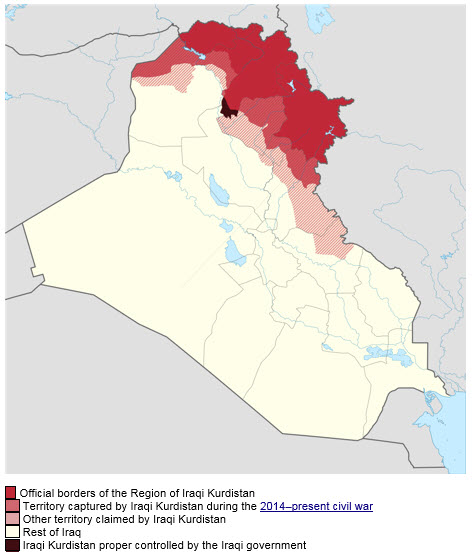
What’s Going on in Iraq
The Kurds in Iraq voted yesterday in a referendum on Kurdish independence. The referendum is non-binding federally, meaning the results will not immediately become a political reality, but it does send a large signal to the Iraqi government that they wish to secede. Iraq was the 4th largest oil producer in the world in 2016, according to the EIA, so any action bringing instability could easily send shockwaves through markets.
Background
The Kurdistan Regional Government (KRG) has long been critical of the Iraqi Prime Minister. Conflict has been brewing between the two political groups for years, leading to the June 7, 2017 announcement of the Referendum which occurred yesterday. The vote was then extended outside of Kurdistan to include other contested areas, including Kirkuk, a major production region. The question posed to voters was simple: “Do you want the Kurdistan region and the Kurdistani areas outside the region’s administration to become an independent state?” Six million Kurds live in Iraq, and five million were eligible to vote in the voting districts. Polls showed 52.9% planned to vote yes, while many more undecideds were leaning towards yes.
What Happens after “Yes”
What happens now is still largely unknown. The referendum is considered binding by the KRG, but the federal government has declared the measure unconstitutional. Imagine if a state in the U.S. attempted to secede – the federal government wouldn’t exactly be thrilled. Same in Iraq. The KRG has said they are using this referendum as political ammo, and will continue to push for independence at the federal level. The Kurdish areas have been semiautonomous since 2014, but they want to be officially separate from Iraq.
Other Countries Say “No”
The United Nations and U.S. have expressed their disappointment with Iraq in allowing the vote to continue. Officials fear the split could cause further instability in the region, which has been rocked by ISIS in recent years. A new nation struggling to establish its own legitimacy would be a perfect home base for ISIS.
In addition, surrounding countries such as Turkey, Iran, and Syria have strongly condemned the measure. Turkey especially, which has a large Kurdish population, is concerned about the precedent Iraq’s Kurdish population could set. Turkey and Iraq announced joint military exercises soon after the referendum near the semi-autonomous regions.
Why Is This in FUELSNews?
Like we mentioned in the beginning, Iraq is the 4th largest oil producer in the world. If instability escalates into conflict between the Kurds and the Iraqi government or Turkey, it could significantly disrupt global oil supplies. But it wouldn’t take a war to significantly impact production.
The region under contest in northern Iraq produces 600 thousand barrels per day (kbpd) of oil production. For scale, that’s one-third of the entire OPEC/Non-OPEC cuts, which account for 1.8 million barrels per day (MMbpd) of production. That oil is pumped to the Mediterranean Sea via the Kirkuk-Ceyhan Pipeline, which ends in Turkey. Turkey has made very clear that they’re willing to take advantage of that, saying, “We have the tap.” Although it’s unlikely Turkey would completely close the tap, they could make it difficult for the Kurds to earn oil revenues.
Conclusion
Some have postulated that the referendum is merely a bargaining tactic. The KRG controls a large patch of oil, and they’re required to share oil revenue with Baghdad. Even if the region doesn’t formally secede, they may use the referendum as leverage to keep more of their oil revenue. Alternatively, if the country does secede, they may be amicable to higher production, with some officials hinting that production would be raised from 600 kbpd to 1 MMbpd.
Whatever happens, uncertainty in oil producing regions never bodes well for oil consumers. We wrote recently about why conflict in North Korea is bearish for markets, but the logic runs opposite in Iraq. Middle East instability threatens far more supply than demand, meaning that it would net take oil off the market. Regardless of what happens, uncertain markets will price in the risk of production coming offline, causing oil markets to rise until more is known.
This article is part of Uncategorized
Tagged:
MARKET CONDITION REPORT - DISCLAIMER
The information contained herein is derived from sources believed to be reliable; however, this information is not guaranteed as to its accuracy or completeness. Furthermore, no responsibility is assumed for use of this material and no express or implied warranties or guarantees are made. This material and any view or comment expressed herein are provided for informational purposes only and should not be construed in any way as an inducement or recommendation to buy or sell products, commodity futures or options contracts.






